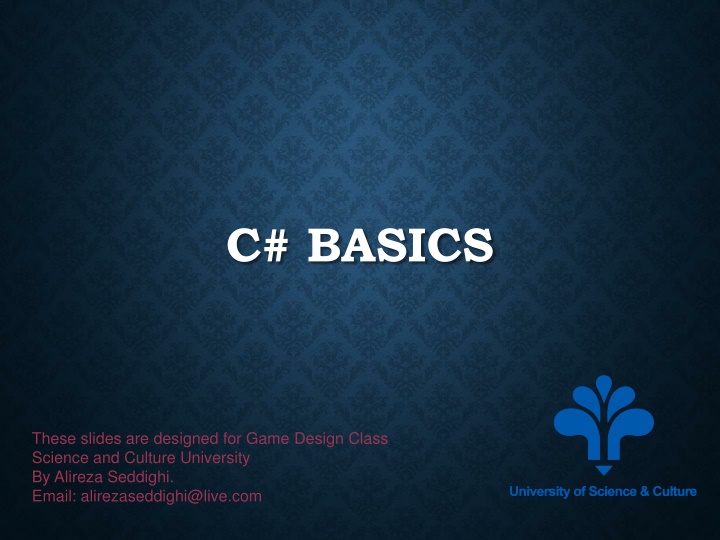
Variable Types, Comments, and Functions in C# Basics for Game Design Class
Explore the fundamentals of C# programming with a focus on variable types, comments, and functions designed for a Game Design class. Learn about assignment and arithmetic operators, comparison and logical operators, and the different types of functions in C#. Enhance your understanding of creating, calling, and utilizing functions in game development.
Download Presentation

Please find below an Image/Link to download the presentation.
The content on the website is provided AS IS for your information and personal use only. It may not be sold, licensed, or shared on other websites without obtaining consent from the author. If you encounter any issues during the download, it is possible that the publisher has removed the file from their server.
You are allowed to download the files provided on this website for personal or commercial use, subject to the condition that they are used lawfully. All files are the property of their respective owners.
The content on the website is provided AS IS for your information and personal use only. It may not be sold, licensed, or shared on other websites without obtaining consent from the author.
E N D
Presentation Transcript
C# BASICS These slides are designed for Game Design Class Science and Culture University By Alireza Seddighi. Email: alirezaseddighi@live.com
VARIABLES Type Name = value; Float speed = 5.2f; Double power = 4.1; Int points = 0; Bool isTrueOrFalse = true;
COMMENTS 2 Types of comments: One line comment Start with // and then the comment Multiple Lines Comment Start with /* Enter the comment in multiple lines And End with */
PRINT IN CONSOLE 1. using print function Print( the things you want to print in console ); 2. using debug.log Debug.log( the things you want to print in console ):
ASSIGNMENT AND ARITHMETIC OPERATORS Assignment Operators = += -= *= /= %= Arithmetic Operators + - / * %
COMPARISON AND LOGICAL OPERATORS Comparison Operators == Equal to != Not Equal to > Greater than < Less than >= <= Logical Operators && And || or ! Not
FUNCTION Create the function : Accessors Type name () { The Functionalities } Calling the Function: FunctionName(); For example in Start function() or in Update Function() Note: there is other prebuild Functions void Awake (){}. What s the use of this Function?
4 TYPE OF FUNCTIONS Type 1: Takes no argument and does not return any values Type 2: Takes arguments and does not return any values Type 3: Takes no argument and returns values Type 4: Takes arguments and returns values
4 TYPE OF FUNCTIONS Type 1: Takes no argument and does not return any values Void print(){ Debug.log( print ); }
4 TYPE OF FUNCTIONS Type 2: Takes arguments and does not return any values Void printArgument(string message){ Debug.log(message); } How to call: printArgument( String ) ;
4 TYPE OF FUNCTIONS Type 3: Takes no argument and returns values Int returnTheValue(){ Retun 2; }
4 TYPE OF FUNCTIONS Type 4: Takes arguments and returns values Int returnTheSum(int a, int b){ Int c = a + b; Retun c; } How to call: returnTheSum(number 1 , number 2);
Controlling Code Flow CODE FLOW
CODE FLOW First rule Start from Top to bottom And it goas Left to right
IF STATEMENTS Statements that run code based on a scenario being true or false, generally written if x then y, else z else if Else If (this condition x is met){ do this }else if (this condition y is met){ do this }else { Neither of the conditions are met then do this } Note: it is a good practice to use if and else if statement only if you have less than 5 conditions What s the alternative then ?
SWITCH/CASE STATEMENTS Usually used when to much condition must be checked. Switch /Case Switch (Some variable like Weapon) { Case 1: Debug.log( knife ); Break; Case 2: Debug.log( axe ); Break; Case 3: Debug.log( dagger ); Break; Case 4: Debug.log( bow ); Break; Default: Break; }
WRITE A CODE WITH IF/ELSE AND SWITCH/CASE Randomly generate a number between 1 t0 5 Assign each number between 1 to 5 to a weapon Check the weapons with if/else if /else and switch/case
LOOPS Multiple repetitions of the same task Type of loops For While Do while Foe each
FOR LOOP If(lower bound ; upper bound ; number of hops for increase of decrease) { Debug.log( something ); } If (i=0; i< 10 ; i++){ print(i); }
WHILE LOOP While (the condition is true ){ Print ( ); } int a = 0 While (a < 10){ Print (a); a++; } Note: infinite loop problem
ARRAYS Create multiple variables of the same type Is a fix sized data structure Type[] name = new type [size]; Note:index out of Bound
